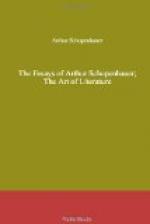When one sees the number and variety of institutions which exist for the purposes of education, and the vast throng of scholars and masters, one might fancy the human race to be very much concerned about truth and wisdom. But here, too, appearances are deceptive. The masters teach in order to gain money, and strive, not after wisdom, but the outward show and reputation of it; and the scholars learn, not for the sake of knowledge and insight, but to be able to chatter and give themselves airs. Every thirty years a new race comes into the world—a youngster that knows nothing about anything, and after summarily devouring in all haste the results of human knowledge as they have been accumulated for thousands of years, aspires to be thought cleverer than the whole of the past. For this purpose he goes to the University, and takes to reading books—new books, as being of his own age and standing. Everything he reads must be briefly put, must be new! he is new himself. Then he falls to and criticises. And here I am not taking the slightest account of studies pursued for the sole object of making a living.
Students, and learned persons of all sorts and every age, aim as a rule at acquiring information rather than insight. They pique themselves upon knowing about everything—stones, plants, battles, experiments, and all the books in existence. It never occurs to them that information is only a means of insight, and in itself of little or no value; that it is his way of thinking that makes a man a philosopher. When I hear of these portents of learning and their imposing erudition, I sometimes say to myself: Ah, how little they must have had to think about, to have been able to read so much! And when I actually find it reported of the elder Pliny that he was continually reading or being read to, at table, on a journey, or in his bath, the question forces itself upon my mind, whether the man was so very lacking in thought of his own that he had to have alien thought incessantly instilled into him; as though he were a consumptive patient taking jellies to keep himself alive. And neither his undiscerning credulity nor his inexpressibly repulsive and barely intelligible style—which seems like of a man taking notes, and very economical of paper—is of a kind to give me a high opinion of his power of independent thought.
We have seen that much reading and learning is prejudicial to thinking for oneself; and, in the same way, through much writing and teaching, a man loses the habit of being quite clear, and therefore thorough, in regard to the things he knows and understands; simply because he has left himself no time to acquire clearness or thoroughness. And so, when clear knowledge fails him in his utterances, he is forced to fill out the gaps with words and phrases. It is this, and not the dryness of the subject-matter, that makes most books such tedious reading. There is a saying that a good cook can make a palatable dish even out of an old shoe; and a good writer can make the dryest things interesting.




